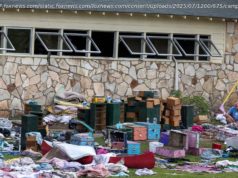Small-town Texas, hit hard. And other stories from Hurricane Harvey.
The workout began under a canopy of stars twinkling in the still-dark sky.
Thirteen shadowy forms sprinting back and forth to orange cones. Dropping to mats for push-ups. Popping back up for jumping jacks. Bending deep for squats.
All gathered for a Camp Gladiator boot camp at 5: 15 a.m. on the Monday after one of the worst weeks Houston has ever had.
Trainer Rebecca Chavez spent much of the previous seven days searching for relatives displaced and missing after Harvey tore through Port Arthur. Her mother-in-law and sister-in-law, who is disabled after a stroke, crawled up to their attic to flee flood waters, were rescued by boat and shuttled to three different emergency shelters before Chavez was able to track them down.
Yet, there Chavez was, in the parking of Bear Branch Elementary School in Kingwood, cheering her campers on with cries of «Find your happy place!»
Single mom Maria Villalobos and her 17-year-old son had been evacuated from her second floor apartment after swirling water overtook her complex, filling parking lots and surging over parked cars. Villalobos, who escaped with just an overnight bag of clothes and a toothbrush, had to step on the roofs of cars to reach a rescue boar and was airlifted to a shelter at Klein Oak High School in Tomball, where she spent several days. Her white Honda Accord could not be saved.
Yet, there Villalobos was, a week after being forced by a flood from her home, rounding lap after lap on the blacktop.
Over the last week, Camp Gladiator crews have volunteered at shelters, gathered donations for victims, checked on fellow campers. Some trainers from San Antonio and Austin loaded up trailers with supplies and food and caravanned to Houston. Many CGers – as they call themselves – are still struggling with lost homes, damaged cars, derailed lives.
Yet, there these campers were, sweating to the sounds of Michael Jackson and Prince blaring over loudspeakers.
«This hour is for you, » Chavez told the group. «If you’re going to help with hurricane stuff, you’ve got to get your fitness in.»
WALLER COUNTY, Texas – The «Chinook community» flying out of the Houston Executive Airport has been bringing much-needed relief to those stranded by Hurricane Harvey — and to each other.
Buckeye II, a Chinook helicopter piloted by Ohio Army National Guard Lt. Col John Whitney and Lt. Tara Pappas took off Monday afternoon. It carried three pallets of water and two of MREs for the people of Kountze, Texas.
The crew arrived Friday. They have flown 22 hours so far, aid missions mostly to the east of Houston, to communities that were cut off by the floods.
Their routine tasks can become grueling in the Houston heat and heavy fatigues. In the small, glass-enclosed pilot’s cabin, Whitney and Pappas gulped down tiny bottles of water to fight the effects of the sun.
The crew tried to keep things light. Once airborne, Whitney ribbed Pappas for being a «stick pig» — which is to say, hogging the controls.
«What was the temperature in Ohio today?» he asked her over the headset, tugging off a heavy leather glove for a moment.
She leveled him a look. It was 94 degrees F in Houston.
Meeting the helicopters in small-town Texas (Posted 11: 16 a.m.)
KOUNTZ, Texas – Pam Dunlap «spent the first day in tears» after Harvey hit Houston, «watching people lose everything they had, » she said. «And then I saw everyone come together and support each other. It’s been uplifting.»
Like many locals in small towns outside Houston, she has been helping ever since.
An employee of the Hawthorne airfield in Kountz, Dunlap has been meeting Chinook helicopters piloted by the Army National Guard on the tarmac for nearly a week straight. Those flights ensure many of her neighbors have access to the necessary food and water.
«I was boated in last Tuesday, and I haven’t left since, » Dunlap said over the sound of helicopter blades, the latest delivery taking place fewer than 500 feet away. Although her home wasn’t flooded, the only way to get to work last week was via the game warden’s boat. Forced to choose between staying dry and helping her community, Dunlap chose the latter.
In all her time in Texas and in Hawthorne, Dunlap said she’s never been a part of a relief effort as large or as forceful as this.
She has helped with countless shipments received over the last six days, with donations of food, water and supplies coming in from states such as Louisiana, Kansas, Arizona, Florida and Georgia.
Although Dunlap noted that Harvey might have knocked Houston back on its heels, she was optimistic.
«You know what?» she said. «We can do it, and we will. We’re Texans.»






![Działo się w czwartek. Oto najważniejsze wydarzenia [SKRÓT DNIA]](http://nhub.news/wp-content/uploads/2025/09/thumb1ca449a5a8af91014ce58a961009a024-100x75.jpeg)